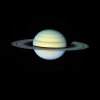Astronomy Highlights
 Saturn slides down the southwestern sky tonight just behind the waxing crescent Moon. You’ll need telescope to see Neptune, but the Moon and Saturn will make a pretty pair without any optical aides.Graphic from SkySafari app.
Saturn slides down the southwestern sky tonight just behind the waxing crescent Moon. You’ll need telescope to see Neptune, but the Moon and Saturn will make a pretty pair without any optical aides.Graphic from SkySafari app. The gigantic planet Jupiter is at opposition tonight — meaning it rises opposite of the Sun at sunset and sets opposite of the Sun at sunrise, making it visible all night long. The gas giant is in the constellation of Gemini and is impossible
The gigantic planet Jupiter is at opposition tonight — meaning it rises opposite of the Sun at sunset and sets opposite of the Sun at sunrise, making it visible all night long. The gas giant is in the constellation of Gemini and is impossible Take a moment tonight and enjoy the first full Moon of 2026.Also, check out the 2026 NASA Science Calendar! You can download the latest calendar and wallpaper backgrounds for a desktop or mobile device.
Take a moment tonight and enjoy the first full Moon of 2026.Also, check out the 2026 NASA Science Calendar! You can download the latest calendar and wallpaper backgrounds for a desktop or mobile device. The Geminids are expected to peak around 1am in the early morning of the 14th. An hourly rate of 150 meteors can be seen if you’re under dark skies, but the number falls to about 50 per hour if viewed from the city. The Geminids are very
The Geminids are expected to peak around 1am in the early morning of the 14th. An hourly rate of 150 meteors can be seen if you’re under dark skies, but the number falls to about 50 per hour if viewed from the city. The Geminids are very The nearly Full Moon (99% illuminated) rises with Pleiades this evening. Grab your binoculars to enhance the view. And, watch tomorrow night as well, to soak up a view of the last Full Moon of 2025. Graphic from SkySafari app.
The nearly Full Moon (99% illuminated) rises with Pleiades this evening. Grab your binoculars to enhance the view. And, watch tomorrow night as well, to soak up a view of the last Full Moon of 2025. Graphic from SkySafari app. Saturn has lost its rings! Set up your telescope tonight to see the rings edge-on. You’ll spot it easily as the bright object (0.9 magnitude) below the great square of Pegasus in the southeastern sky. This only happens every 15 years. So, invite
Saturn has lost its rings! Set up your telescope tonight to see the rings edge-on. You’ll spot it easily as the bright object (0.9 magnitude) below the great square of Pegasus in the southeastern sky. This only happens every 15 years. So, invite Happy Halloween! It’s an astronomical holiday — the cross-quarter day between the fall equinox and winter solstice (the actual date slips a bit, but Halloween remains the same). The Moon won’t be full until next week, but no one says you can’t howl
Happy Halloween! It’s an astronomical holiday — the cross-quarter day between the fall equinox and winter solstice (the actual date slips a bit, but Halloween remains the same). The Moon won’t be full until next week, but no one says you can’t howl The Orionid Meteor shower peaks tonight! The shower’s radiant is in the raised hand of Orion. It’ll peak in the early morning hours of the 21st. Bundle up, find a dark sky, and invite a friend to watch remnants of Halley’s Comet stream across our
The Orionid Meteor shower peaks tonight! The shower’s radiant is in the raised hand of Orion. It’ll peak in the early morning hours of the 21st. Bundle up, find a dark sky, and invite a friend to watch remnants of Halley’s Comet stream across our Happy Fall Equinox! Grab a pumpkin spice latte, kick some leaves and embrace the changing seasons.Wondering what the equinox is all about? Join us to take a deep dive into this astronomically significant day and explore the constellations of autumn
Happy Fall Equinox! Grab a pumpkin spice latte, kick some leaves and embrace the changing seasons.Wondering what the equinox is all about? Join us to take a deep dive into this astronomically significant day and explore the constellations of autumn Saturn is at opposition tonight! It rises at sunset and sets at sunrise — exactly opposite of the Sun’s position in our sky and making it possible to observe the magnificent ringed-planet all night long.Saturn is always a stunning sight in a
Saturn is at opposition tonight! It rises at sunset and sets at sunrise — exactly opposite of the Sun’s position in our sky and making it possible to observe the magnificent ringed-planet all night long.Saturn is always a stunning sight in a


